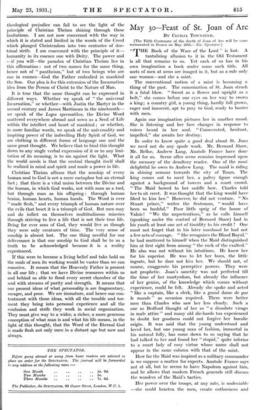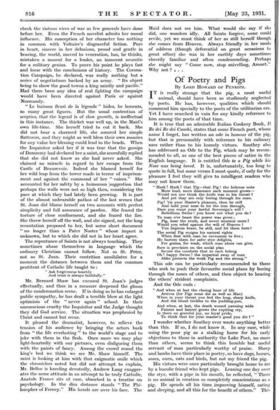May 30—Feast of St. Joan of Arc
By CECILIA TOWNSEND.
(The Fifth Centenary of the death of Joan of Arc will be •om- memorated in Rouen on May 30th.—En. Spectator.]
"THE Book of the Wars of the Lord " is lost. A tantalizing allusion to it in the Old Testament is all that remains to us. Yet each of us has in his own imagination a book under some such title. All sorts of men at arms are imaged in it, but as a rule only one woman—and she a saint.
The conventional notion of a saint is becoming a thing of the past. The canonization of St. Joan struck it a fatal - blow. " Sweet as a flower and upright as a bolt," she comes before our eyes on her way to crown a king; a country girl, a young thing, hardly full grown, eager and innocent, apt to pray to God, ready to banter with men.
Again our imagination pictures her in another mood. She is listening and her face changes in response to voices heard in her soul. " Consecrated, hesitant, impelled," she awaits her destiny.
In order to know quite a good deal about St. Joan we need not do any spade work. Mr. Bernard Shaw, Mr. Belloc, Andrew Lang, Anatole France have done it all for us. Scene after scene remains impressed upon the memory of the desultory reader. One of the most delightful he owes to Andrew Lang. The maid is riding in shining armour towards the city of Tours. The king comes out to meet her, a paltry figure enough against a background of towers and a court crowd. " The Maid bowed to her saddle bow. Charles told her to sit erect. It was thought that the king would have liked to kiss her." However, he did not venture. " No Stuart prince," writes the Scotsman, " would have been so bashful." Poor little sprig of the house of Valois ! " We the unpretentious," as lie calls himself (speaking under the control of Bernard Shaw) had in his youth at least one act of timidity to his credit ! One must not forget that in his later manhood he had not a few acts of courage. " She recognizes the Blood Royal," he had muttered to himself when the Maid distinguished him at first sight from among " the nick of the exalted." He also was not without his intuitions. He knew her for his superior. He was to let her burn, the little ingrate, but he dare not kiss her. We should not, of course, exaggerate his perceptive powers. They were not prophetic. Joan's sanctity was not perfected till the time of her martyrdom, but already the influence of her genius, of the knowledge which comes without experience, could be felt. Already she spoke and acted " like a captain, like a clerk, like a grand dame de par le monde " as occasion required. There were better men than Charles who saw her less clearly. Such a one as Bedford thought of her as " a dissolute virago in male attire " and many old die-hards too experienced to doubt her goodness could not forgive her bucolic origin. It was said that the young understood and loved her, but one young man of fashion, immortal in his natural folly, has come down to us saying that he had talked to her and found her " stupid," quite inferior to a court lady of easy virtue whose name shall not appear in the same column with that of the saint.
How far the Maid was inspired as a military commander is we suppose a matter for experts. Anatole France says not at all, but he seems to have Napoleon against him, and he allows that modern French generals still discuss the wonders of the Maid's tactics.
Her power over the troops, at any rate, is undeniable —she could hearten the men, create enthusiasm and cheek the riotous vices of war as. few generals have done before her. Even the French novelist admits her moral influence. His conception of her character has nothing in common with Voltaire's disgraceful fiction. Pure in heart, sincere in her delusions, proud and gentle in bearing, the world, moved to veneration, has, he thinks, mistaken a mascot for a leader, an innocent neurotic for a military genius. To prove his point he plays fast and loose with the conclusions of history. The Corona- tion Campaign, he declared, was really nothing but a series of negotiations backed by an army. " Its object being to show the good towns a king saintly and pacific." Had there been any idea of real fighting the campaign would have been directed against Paris or against Normandy.
. " Le buisson fleuri de la legende " hides, he laments, so many great figures. But the usual contention of sceptics, that the legend is of slow growth, is ineffectual in this instance. The thicket was well up, in the Maid's own life-time. She herself tried to cut it back. She did not bear a charmed life, she assured her simple flatterers, and they might as well bless their own rosaries for any value her blessing could lend to the beads. When the Inquisitor asked her if it was true that the gossips of Domremy had declared her a saint, she scornfully replied that she did not know as she had never asked. She claimed no miracle in regard to her escape from the Castle of Beaurevoir. Indeed she blamed herself for her wild leap from the tower made in terror of imprison- ment and against the command of her " voices." She accounted for her safety by a humorous suggestion that perhaps the walls were not so high then, considering the pace at which they had lately been growing. It is part of the almost unbearable pathos of the last scenes that St. Joan did blame herself on two accounts with perfect simplicity and full assurance of pardon. She feared the torture of close confinement, and she feared the fire. She threw herself off the wall, and she signed, not the long recantation proposed to her, but some short document " no longer than a Pater Noster " whose import is unknown, but to which she did not in her heart agree.
The repentance of Saints is not always touching. They sometimes abase themselves in language which the ordinary Christian cannot follow. Not so St. Peter, not so St. Joan. Their contrition annihilates for a moment the distance between them and the common pentitent of Catholic life taught to :
" Ask forgiveness heartily And trust it always faithfully."
Mr. Bernard Shaw has excused St. Joan's judges effectually, and thus in a measure deepened the gloom of the condemnation scene. If in doing so he has enlarged public sympathy, he has dealt a terrible blow at the light optimism of the " never again " school. In their unconscious cruelty the Inquisitor and the Judge thought they did God service. The situation was prophesied by Christ and cannot but recur.
It pleased the dramatist, however, to relieve the tension of his audience by bringing the actors back from " the life everlasting " to the world's stage and to joke with them in the flesh. Once more we may play light-heartedly with our pictures, even disfiguring them with the paints of fancy. Among the crowd round the king's bed we think we see Mr. Shaw himself. The saint is looking at him with that enigmatic smile which the chroniclers noted but did not attempt to explain, Mr. Belloc is kneeling devotedly, Andrew Lang exagger- ates the same attitude in an attempt to be truly Catholic, Anatole France sits at ease, absorbed in a treatise on psychology. In the dim distance stands " The Phi- losopher of Ferney." His hands are over his face. The Maid does not see him. What would she say if she did,: one wonders idly. All Saints forgive, none could revile, yet we must think of her as still herself though she comes from Heaven. Always friendly in her mode of address (though deferential on great occasions to great office) she was in her earthly days sometimes cheerily familiar and often condescending. Perhaps she might say " Come now, stop snivelling, Arouet." Why not ? ; . .







































 Previous page
Previous page